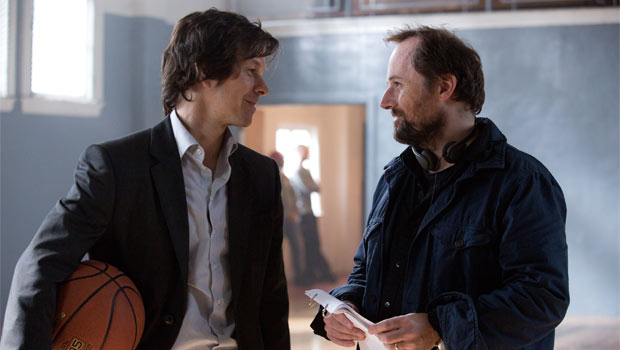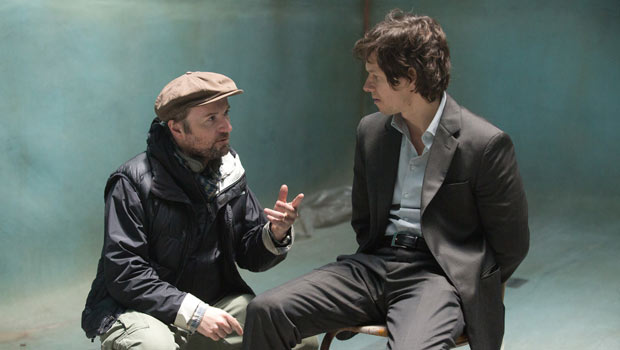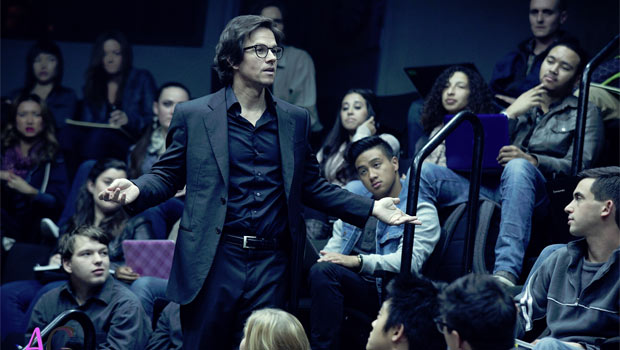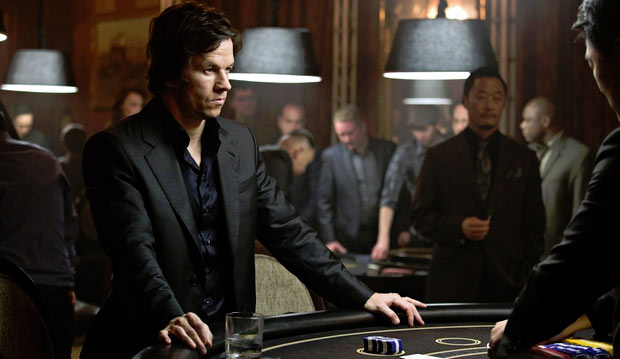Rupert Wyatt Interview (The Gambler)
In director Rupert Wyatt’s new film, The Gambler, Mark Wahlberg stars as a privileged professor of English literature whose gambling addiction threatens to destroy his life. A reimagining of James Toback’s acclaimed 1974 autobiographical film starring James Caan and directed by the late Karel Reisz (The French Lieutenant’s Woman), the new movie, set in the criminal underbelly of contemporary Los Angeles, promises both a marked departure and an update from the original.
Produced by Wahlberg (in conjunction with the legendary Irwin Winkler), the new film is penned by Oscar winning screenwriter William Monahan and features a supporting cast which includes Brie Larson (Short Term 12) as Wahlberg’s pupil, Amy, Oscar-winner Jessica Lange (American Horror Story), as his mother, Roberta, and John Goodman (The Monuments Men), as Frank, a dangerous loan shark to whom he becomes indebted.
In the director’s chair for the new Gambler is British filmmaker, Rupert Wyatt, who marked his Hollywood debut in 2011 with Rise of the Planet of the Apes. Born and raised in the UK, Wyatt began making films as a boy (eventually winning a BBC film competition at the age of 16). His career took flight while he was still a student in Paris, followed by five years of developing features in New York for Shooting Gallery, Miramax and Radical Media. Back in the UK, Wyatt began working in episodic television and eventually made his mark in 2008 with the award-winning prison-break feature The Escapist, which premiered at Sundance that year. He is also the founder of the film collective, Picture Farm, which has produced numerous shorts, documentaries and features.
Production on his latest directorial effort, The Gambler, began this January with locations scattered in and around Los Angeles. We spoke with Wyatt during a break from shooting on the film’s set – an underground Asian gambling den recreated in a North Hollywood warehouse – as The Gambler entered the final week of production.
Why did you want to make The Gambler? What was it that attracted you to the project?
That’s the million dollar question isn’t it? For me it’s always script based. I didn’t know the original, but I knew of it… And having done a film before that was technically a reboot [Rise of the Planet of the Apes], the last thing I wanted to do was a remake. But when I read the script… Well, Bill Monahan is such a singular writer and such an independent writer in so many ways. He has such a clear voice. It was clearly its own thing, not just in terms of setting, but the central key character. He’s a very different character, Jim, to the Axel character (played by James Caan) of the original. And by that I mean it’s a much more freewheeling sensibility. This man isn’t so much a degenerate gambler. He’s more a man who’s trying to find himself and his own identity and he’s trying to use gambling as a way of doing that… I’m not a gambler myself. And when I read the script, I realized it was less about that and more about how we all make choices in life, gambles that either pay off or don’t. I found that really fascinating… I just fell in love with it.
When you came onboard was Mark Wahlberg already set in the leading role?
He was, yes… Mark is a producer as well as the star. So he obviously wanted to sit down and talk to me first (laughs). We didn’t know each other. I obviously know of Mark and he knew of me by way of Rise of the Planet of the Apes. So we had a meeting and very quickly realized that we were very much on the same page in terms of what we wanted to do with this. I then met with Bill (writer, William Monahan), which for me was very important – just to get under his skin and understand, page by page, what exactly he was intending to do.
How different is William Monahan’s script from James Toback’s original?
Even though the original is a very autobiographical piece of James Toback’s early life, he himself used Dostoyevsky’s novella (“The Gambler”) as an inspiration, saw the similarities there, and exploited them. And so when Bill came onto this, that was where he went [too]. There are certain similarities of course to the original film … [But] I think what Bill tried to do with this script was make it more of a character-driven sort of narrative that’s more in keeping with a Hal Ashby film, tonally close in a way to that world of Shampoo and The Last Detail, rather than a hardcore story of a man drowning in a sea of addiction.
Is that where you’re going with your directorial approach?
Very much so… It’s more about a man who is actually re-finding himself and looking for ways to break out of this gilded cage that he’s been born into.
Tell us about working with Mark Wahlberg. I understand he lost nearly 60 lbs for the role. Was that your idea?
Well, we talked about it together early on… Obviously, there are many writers and teachers that are heavy. There are many that are rake thin, and some that are in-between. And so we spoke about it. But I think we both understood, ultimately, why we felt it was best to go this way… Mark is one of the most extraordinary, multifaceted actors I’ve ever had the privilege of working with. He can do comedy, he can do action and he can do drama. And very, very few actors, and very few movie stars, can do that. It’s an amazing thing to watch. But specifically, I think everyone has a preconception of Mark Wahlberg… He is very physical. So it was great for us to be able to immediately shake the audience up by putting him into the suit of his character in a much more rakish, wolfish, stripped down way.
How has it worked out on set?
Well, on the first day we shot one of the biggest scenes of the film, which is the lecture, a ten minute sequence. We had about 200 extras, all students, and we had all the crew. Everyone was new. Everyone was sort of stepping up on the first day. And then we have our main actor come in, and he did a ten minute unbroken take of that full monologue. And he didn’t miss a beat. Just the way he looked and the way he performed, you could just see in the faces of all of these people, this look of complete awe. He got a spontaneous round of applause from everyone that day. And in that moment I realized, “Ok, it’s going to work.”
Tell us about Mark’s character, Jim Bennett.
When you have an actor like Mark play what on paper could be a very unlikeable character, it’s amazing. His character doesn’t care about anything or anyone and he says as much… He’s that kind of a guy. And I think there’s a real enjoyment out of watching a character on screen do that, sort of like Randle Murphy from One Flew Over the Cuckoo’s Nest. When you have an actor like Mark Wahlberg, who is so instinctively liked and empathetic in so many ways, and you cast him in that slightly darker, more edgy way, I think it’s a really great combination.
What was the genesis of the project itself?
From my understanding, Irwin Winkler, who’s the producer of this, who produced the original, first took the idea of remaking the movie to Paramount. They then engaged Bill [Monahan] once they had Martin Scorsese and Leonardo DiCaprio attached. Both of those guys decided they didn’t ultimately want to do it… But interestingly, Bill never did a rewrite. His first draft just got everyone very excited. And then I think it came to Mark. Mark looked at it and thought, ‘I love this.’ And he and Bill obviously have a relationship.
From The Departed…
From The Departed. One of Mark’s amazing skills, which I think comes from his days as a singer and a performer, is he has an amazing ability with language. Bill’s writing is like lyrics in many ways, and Mark is one of those few actors that can actually deliver a very dense piece of writing in a completely articulate, clear way. I think he really relishes Bill’s dialogue for that reason.
What was the biggest challenge in bringing it to the screen?
This sounds like I’m doomed for failure, but there wasn’t anything that was that particularly challenging (laughs). It’s been an amazing experience, actually.
What’s it been like filming in Los Angeles? I understand LA is very much a character in the film?
Very much so. We had an amazing opportunity to be able to shoot here, which is very rare nowadays because it adds money to the budget. Fortunately, Paramount was willing to support it as the film is actually set here… For me, I wanted to find a Los Angeles that you don’t necessarily see on screen. The preconception of Los Angeles is that it’s all bright lights, palm trees and Hollywood. In this film, we see everything but. That said, there are aspects of that world that we do delve into, the more wealthy aspects. Jim, Mark’s character, his background, his place in the world, is one of entitlement and luxury and opulence in many ways. But he’s looking to cast all of that out. That’s why he’s going into these other worlds, these underworlds basically. And the downtown of Los Angeles, personally, I find incredibly fascinating for that reason. Not only does it have an extraordinary history – it was the epicenter of this part of the world 100 years ago – but now it’s, albeit with some pockets of gentrification, this faded place whose glory days are gone… So being able to explore all of that, its juxtaposition to the west side of town, is really great.
Tell us about your ensemble… John Goodman, for example. I understand you asked him to shave his head?
Yes (laughs)… And I’m very pleased I did! The transformation is amazing. He plays a moneylender called, Frank. He’s one of three moneylenders – they’re kind of like the wolves that are descending from the hills and closing in on Jim. We have Mr. Lee (Alvin Ing), an elderly Korean gentlemen, a seemingly innocuous figure who becomes a sort of ‘Keyser Soze’ (The Usual Suspects) figure. Then there’s Michael K Williams as Neville, a Black Panther type… He’s actually quite serious, looking to give back to his community – whilst also robbing the rich. And then John Goodman, who’s kind of a decayed Frank Sinatra who has fingers in many pies. He hangs out at gambling dens like this one, lending money to people, and fleecing them.
Jessica Lange?
Jessica Lange is playing [Mark Wahlberg’s] mother, who in a way is the cause of all his unhappiness. A working class type, she’s crawled her way into her position by marrying into this very wealthy west coast family… Mark’s character is the product of that marriage, this dysfunctional son, who has no relationship at all with his mother apart from trying to steal money from her. She, of course, doesn’t understand why he doesn’t want to embrace this world that she’s fought so hard to become part of.
What kind of film should audiences expect? What are we in store for?
It’s got all of the tropes of the great genre movies. And by that I mean we’re looking to, as you said, bring a real character to LA in the same way that Chinatown , The Long Goodbye and those films have always done by giving the city its own identity. But I’m also trying to give it a really free-wheeling spirit that works against the seriousness of the situation. It’s by no means going in the direction of Get Shorty. It’s not that kind of heightened comedy or reality. It’s a grounded reality, but one where characters are a little bit above and beyond our own world. Ultimately, it’s a redemption story, really, and I think those are always the best stories… I just have to say it’s been an amazing privilege and an amazing opportunity as a filmmaker to have the chance to make a film like this.
The Gambler is now available on DVD & Blu-ray and for a chance to win the film, please visit https://www.impulsegamer.com/win-the-gambler-on-dvd/










